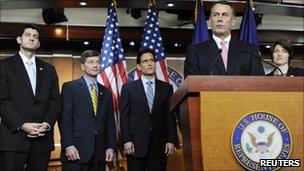US debt reduction 'super-committee' takes shape
- Published

Analysts expect the panel's Republicans will fiercely resist tax increases to lower the deficit
A bipartisan "super-committee" of US congressmen tasked with devising a way out of America's debt crisis has begun taking shape.
Nine of 12 members of the House and Senate have been now been chosen by Democratic and Republican leaders.
They will have until 3 November to recommend a plan to trim $1.5tn (£930bn) from the deficit in 10 years.
The bipartisan panel was created as part of a deficit reduction and debt limit law that passed last week.
The US owes more than $14tn in debt and runs an annual budget deficit of more than $1.4tn.
On Wednesday, House Speaker John Boehner, a Republican, picked Jeb Hensarling of Texas and Dave Camp and Fred Upton, both of Michigan, as his selections to the panel.
Also, Republican Senate Minority Leader Mitch McConnell named Jon Kyl of Arizona, Pat Toomey of Pennsylvania and Rob Portman of Ohio as his picks.
On Tuesday, Senate Democratic Majority Leader Harry Reid named Senators Patty Murray of Washington, John Kerry of Massachusetts and Max Baucus of Montana to the panel.
Still outstanding are three selections from Democratic House Minority Leader Nancy Pelosi.
Deadlock anticipated
The committee was formed as part of a bipartisan compromise that last week raised the US debt ceiling to allow more borrowing and cut $1tn from the US budget.
It is tasked with recommending on a majority vote $1.5tn in deficit reduction over 10 years. Both houses of Congress will then have to hold an up-or-down vote by the end of the year.
If the committee fails to issue a recommendation, a series of painful spending cuts will automatically occur, split evenly between defence and domestic programmes dear to Republicans and Democrats, respectively. Those automatic cuts are described as an enforcement mechanism to encourage bipartisan cooperation.
Polling has indicated most Americans see a mix of tax increases on the wealthy accompanied by some spending cuts as the best way to trim the US budget deficit.
On Wednesday, a new poll from CNN and ORC International, external found 63% of those surveyed said the committee should increase taxes on corporations and wealthy Americans, and 57% called for "major cuts" in spending on domestic programmes.
Only 35% said the committee should recommend "major changes" in the Social Security pension programme and the Medicare health programme for pensioners.
But pessimistic analysts in Washington have predicted the panel will remain deadlocked along party lines, with Republicans refusing measures to raise new tax revenue and Democrats digging in to protect social programmes for the poor and elderly.
- Published8 August 2011
- Published6 August 2011
- Published6 August 2011
- Published3 August 2011